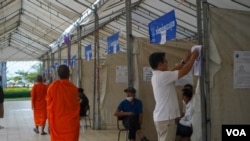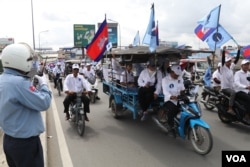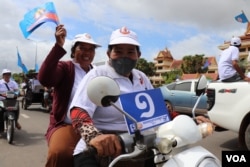Some 9 million Cambodians are registered to cast their ballot for one of 17 parties in the Commune and Sangkat Elections on Sunday June 05. The vote is largely viewed as a showdown between the long-ruling Cambodian People’s Party (CPP) and the revived opposition Candlelight Party.
The elections will reveal what’s left of Cambodia’s democratic space after the CPP government banned the main opposition party in 2017 and only recently allowed political opposition to return amid authoritarian restrictions.
Interest in the polls appeared subdued in recent weeks, as many voters said the Candlelight Party had struggled to reach them in a repressive and CPP-dominated environment, which also put pressure on the electorate.
“It is quiet, not crowded as before”
Ear Seang, a Tuk Tuk driver near Phnom Penh’s Old Market, told VOA Khmer, “There seems to be no hope [for change], [parties] just stand for election, [voters] just vote for the ballot. The leader is still the same leader.”
Chan Tha, a 61-year-old Pass App driver in Phnom Penh, told VOA Khmer: “In the previous [local elections] mandate, people were thrilled. I want to say that everyone was happy. In this [election] mandate, things seem normal… I say it is quiet, not crowded as before.”
During the 2017 local elections, the Cambodian National Rescue Party (CNRP) took a surprise 44 percent of the vote but the CPP government initiated a court case that banned the CNRP. Its leader Kem Sokha was arrested amid a broad crackdown on democratic freedoms.
“If the Candlelight Party won, the government could dissolve it again”
Some voters feared that Prime Minister Hun Sen’s CPP would meddle with the polls and not tolerate any significant opposition success.
“I’m afraid it’s not a fully free and fair election because the NEC [National Election Commission] is not independent,” said Nuth Sovann, a foreman at a construction site along National Road 1 in Banteay Dek Commune, a few kilometers south of Phnom Penh in Kandal Province.
“People started to get a sense that the comeback of the CP [Candlelight Pary] can compete with the CPP in the last few months. But they still think that if the CP won, [the government] could dissolve the CP again.”
He also told VOA Khmer, “Some people won’t show support to the opposition openly because they are afraid of being warned by authorities and being discriminated against when requesting administrative paperwork.”
Banteay Dek Commune had been an opposition stronghold for years before the crackdown, with most voters backing the CNRP and earlier, the Sam Rainsy Party.
“I think Candlelight Party may be able to get some seats, but not as many as before” like the CNRP, said the construction worker, Nuth Sovan.
The CNRP was a merger between the parties of Kem Sokha and longtime opposition figure Sam Rainsy. In late 2021, the latter’s party was rebranded the Candlelight Party, in allusion to its familiar logo, which allowed it to compete while keeping distance from the exiled and convicted Sam Rainsy.
The Candlelight Party built on its established grassroots network and recognizability. It mobilized 23,679 candidates to compete in almost all 1,652 communes and sangkats (municipal areas)—greatly outnumbering other opposition parties, such as the Beehive Social Democratic Party, Cambodia Reform Party and Khmer Will Party.
The National Election Commission later cancelled the Candlelight Party’s candidate lists in 26 communes.
Voter intimidation and vote buying
The Asian Network for Free Elections said pressure on independent media and civil society was hindering voter access to information and election observing.
Candlelight Party candidates reported local harassment from CPP supporters and state officials, who have hindered their public presence and campaign. Reports of voter intimidation also abound.
Hul Bunheng, a 58-year-old widow living with his only son in Banteay Dek Commune, said he relied on $25 in monthly government benefits through the ID-Poor Card system to supplement his income from farming and construction work.
He said opposition members had been absent from his neighborhood, while CPP had called meetings and information was shared among residents and online that those who don’t vote CPP would lose their ID Poor Card.
Another local named Khoeun Chhoeun said each of her family members received the equivalent of $5 and household items from the supporters of the CPP in the weeks before the polls.
“I will vote for CPP for sure because they support our livelihood. Look, they gave us money and [their government] raised us,” she said, adding, “Everyone here believes in them.”
In a village away from the highway in Banteay Dek Commune, farmer Nin Pilot, 38, told reporters he not seen a single Candlelight Party campaigner or sign, even though the polls were just days away, while the CPP was omnipresent.
“I’m following the news closely, but I am still not certain of what party to rely on,” Nin Pilot said, “It’s less vibrant than the previous [commune] election at this same period. People express less opinions. Before, we had opposition, but now there is only one [party]; no other could compete with” the CPP.






